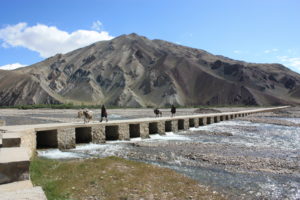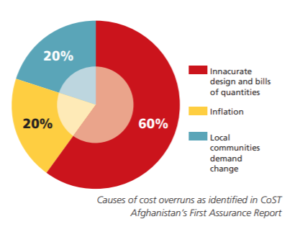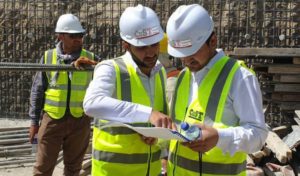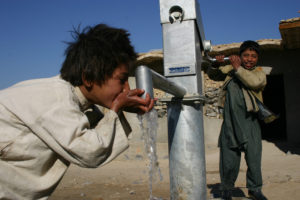CoST – the Infrastructure Transparency Initiative (CoST) is the leading global initiative improving transparency and accountability in infrastructure. Working around the world, CoST brings together government, private sector and civil society to see better value from infrastructure investment. This impact story explores how in Afghanistan, the CoST approach has contributed to a saving of AFN 646 million (US$8.3 million) through the creation of an independent, pre-contract oversight body.
Story highlights:
 CoST Afghanistan’s First Assurance Report in 2018 identified major problems in the preparation stage of the project cycle, particularly relating to inaccurate surveys and inconsistent designs, which led to time and cost overruns.
CoST Afghanistan’s First Assurance Report in 2018 identified major problems in the preparation stage of the project cycle, particularly relating to inaccurate surveys and inconsistent designs, which led to time and cost overruns.- The assurance report recommended procuring entities improve their preparation procedures and build capacity to strengthen design and tender oversight.
- This led to action from the National Road Authority, which created the Design Review Unit. After reviewing the contracts of over 100 infrastructure projects and recalculating quantities and costs, the Unit saved US$8.3 million between 2018–2019 alone.
Infrastructure governance in a complex environment
Over the past decade infrastructure investment in Afghanistan has prioritised the construction and maintenance of its road network – a key prerequisite to economic development with the potential to transform civilian lives. The 2016–2017 Afghanistan Living Conditions Survey revealed that just 63% of the rural population lives within 2 km of an “all-season road” (one which can be accessed all year). For a country suffering from endemic levels of unemployment, the ability to connect people, goods and services provides a critical opportunity for social and economic development as it rebuilds after nearly three decades of war.
In an interview with CoST, Kabul citizen and civil engineer said:
“We all know that roads play an important role in socio-economic development of Afghanistan. On the one hand, they improve national transport links and help traders deliver their goods, and on the other hand they help local people access cities and travel safely. In every country – but especially in our country – roads affect sustainable development in cities and rural communities.”
Whilst the Afghan Government and donors have heavily invested in road construction, project implementation has been marred by issues of inefficiency and mismanagement of public funds. As of 2016, the Special Inspector General for Afghanistan Reconstruction found instances of waste, fraud and abuse in reconstruction efforts totalling between US$2.2 billion and US$3.5 billion. This, alongside persistent damage to newly built highways from the ongoing Taliban insurgency, has dented progress in the delivery of quality roads.
Afghanistan joins CoST, beginning journey to better infrastructure
When Afghanistan joined CoST in 2013 it did so to tackle these problems using the CoST approach of multi-stakeholder working, disclosure, assurance and social accountability. Through CoST, awareness has been raised on major issues particularly concerning project design, which adversely affects their likelihood of being delivered on time and to budget.
After CoST highlighted these issues alongside pragmatic solutions, a Design Review Unit was established as an independent entity to provide oversight to the project planning and design stages. Importantly, this ensures that projects are correctly costed before contracts are signed, as they cannot be amended once this happens. The results of having an oversight body of this kind speak for themselves – since its establishment the Unit has reviewed 101 projects leading to a cost saving of US$8.3 million.
According to the former Minister of Public Works:
“If we had these sorts of safeguards [including CoST] in place in 2003, then we would have saved hundreds of millions of dollars on public infrastructure… without them it has been difficult to take any company to arbitration.”
CoST Assurance shines light on Afghanistan’s road network
Assurance is an independent review of the data disclosed on infrastructure projects. It is designed to ascertain the validity of the data and highlight problems and areas of good practice. Assurance reports allow the facts to speak for themselves and set out recommendations to improve the efficiency, quality and impact of current and future infrastructure works.
CoST Afghanistan’s First Assurance Report in 2018 identified major problems in the preparation stage of the project cycle, particularly relating to  inaccurate surveys and inconsistent designs, which led to time and cost overruns.
inaccurate surveys and inconsistent designs, which led to time and cost overruns.
“The design stage is the backbone of a road project. When projects are designed accurately and professionally, implementation can proceed without delay. However, inaccurate design adversely influences the project’s quality and will lead to changes in its scope, length and cost.”
One of the recommendations from the assurance report was for procuring entities to improve their project preparation procedures, and build capacity to ensure that design and tender oversight are strengthened. This has been an ongoing issue in Afghanistan, found in numerous cases across published literature: a 2009 report from the World Bank pinpointed poor oversight capacity and a lack of project monitoring and evaluation as some of the key vulnerabilities leading to corruption in the road sector.
CoST recommendations catalyse government action
After the launch of CoST Afghanistan’s First Assurance Report, the National Road Authority – the body responsible for implementing and maintaining Afghanistan’s highways – decided to pilot the Unit to address the challenges the report raised.
Former Head of Design Review Unit recalls some of these issues:
“The National Road Authority was facing significant problems. Projects often lacked feasibility studies, their design was inaccurate, hydrological studies were ignored, and there were many instances of inaccurate quantities and costs. These problems encouraged collusion between contractors and site managers and ultimately facilitated corruption.”
The idea behind the Unit was simple: a team of independent engineering experts would serve as a second pair of eyes on project designs, ensuring that projected costs, estimated schedules and technical details were in order before the contract was signed.
This approach was piloted on the Kabul-Ghazni Second Line Project and resulted in a final cost saving and improved project delivery. This demonstrated the potential longer-term benefits of implementing checks and balances in the award of contracts and, following this, the Unit was formally established in 2018.
Since then, 101 projects have been reviewed, which has led to savings of US$8.3 million. In a country where infrastructure needs far exceed available resources – and where the impact of climate change is taking its toll on already fragile structures – this money can now be reinvested in critical areas such as schools, highways and water infrastructure.
Deep dive: Savings and safety on the Kunduz-Khulm Highway
The Kunduz-Khulm Highway is 112 km in length and has been under construction since 2015. It runs through the province of Kunduz in northern Afghanistan and will facilitate travel and trade between the two provinces of Kunduz and Balkh. It also has strategic economic be nefits and will increase connectivity between Afghanistan, Tajikistan and Uzbekistan by connecting the ports of Hairatan and Sher Khan. Funded by the German Government, the highway is estimated to cost €95 million (US$108.3 million). The design of the third stage of the project was carried out by a German consultancy, and sent to the Unit in February 2019 by the Ministry of Public Works.
Uncovering key issues in project design
Engineers from the Unit began an extensive review of the project design, finding numerous issues, which would have impacted on the final cost and  quality of the highway. Disturbingly, this included a lack of geotechnical survey – the assessment of site conditions such as soil consistency and structure. For this to be missing altogether was an oversight, which would have had long-lasting impact on the cost, quality and timespan of the project. This would have led to the repeat of the same issues, which had plagued project delivery in Afghanistan for years.
quality of the highway. Disturbingly, this included a lack of geotechnical survey – the assessment of site conditions such as soil consistency and structure. For this to be missing altogether was an oversight, which would have had long-lasting impact on the cost, quality and timespan of the project. This would have led to the repeat of the same issues, which had plagued project delivery in Afghanistan for years.
Additionally, basic pre-requisites to accurate project design were also missing. Despite plans to build a bridge along the road, no hydrological study had been conducted, which meant the plans lacked essential information around drainage and water management. This was a major omission in a country where ongoing drought has caused a humanitarian crisis and mass displacement since 2018.
Saving millions through pre-contract oversight
As well as a lack of basic oversight in the design of the Kunduz-Khulm Highway, the Unit uncovered numerous instances of miscalculations in the itemised bill of quantity for the project’s materials, parts and labour. This included a reduction in the number of vehicles used from 120 to 20, saving US$0.43 million. Calculations for the volume of demolition and excavation along the road were also overestimated by over 160,000 m3, saving US$0.76 million after recalculation.
In the Kunduz-Khulm Highway project alone, amendments made by the Unit led to a net total saving of US$2.6 million. It is now possible to reinvest this money in other critical infrastructure projects and serves as an example of the long-term impact on cost and quality that the Unit could achieve.
 Changing the narrative around infrastructure in Afghanistan
Changing the narrative around infrastructure in Afghanistan
Infrastructure has a major role to play in overcoming the challenges Afghanistan faces as it grapples with the impact of unemployment, conflict, climate change and a growing population. As outlined in this impact story, the CoST core feature of assurance helped shine a light on issues in project preparation, catalysing the creation of the Design Review Unit, which in turn transformed processes and saved millions. Not only did this improve cost savings and the quality of infrastructure, but by building capacity and creating a culture of accountability and oversight, it changed the nature of public investment more broadly. Ultimately, these changes create real impact which help CoST achieve its mission of better lives from better infrastructure.
Final image credit: UNDP/Flickr